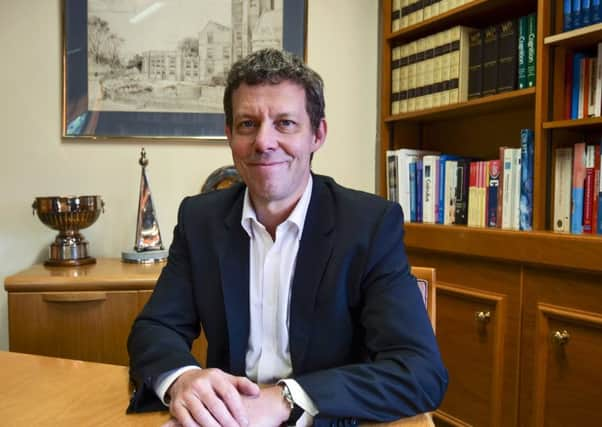Sheffield University’s new vice chancellor on the challenges of running a modern university and the impact of Brexit


Sheffield University’s vice-chancellor started his job last November and – given the institution’s sheer size – it really has taken until now to see every department and meet all the key staff.
“I got to speak to hundreds of people,” he says. “You really then find out what the beating heart of the place is... and that was just tremendous.”
Advertisement
Hide AdAdvertisement
Hide AdThe Belgium-born psychologist was vice-chancellor at York University before succeeding Prof Sir Keith Burnett, who retired following a decade-long tenure in one of the most important positions in British higher education, one that involves leading more than 29,000 students and nearly 7,000 members of staff while maintaining an annual turnover in excess of £575m.


“These are very big jobs,” he says. “They are just about doable, I would say – just about. There are times when you think ‘This is too much for one person’, and that’s why so many universities have created whole cadres of senior leadership around them. I think if you start turning this role into one that is more ambassadorial or presidential then you become less involved in the everyday running of the organisation. You have to try and do it all. That’s sometimes quite challenging.”
And anyway, he suggests, the university is too disparate to have one person fully embodying its outlook and activities.
Advertisement
Hide AdAdvertisement
Hide Ad“You have a very diverse community of bright people with often very strong views that you don’t control,” says Prof Lamberts. “You can try to speak for that whole community, but underneath there is always a spectrum of difference. They’re not like traditional organisations where you can dictate a corporate line and rely on everybody following that. Universities are different – you have a community that’s very autonomous, very self-driven. You just have to be able to work with that and try to steer that in a direction that is broadly benign and acceptable.”
He has already, however, been vocal about the need for the new Prime Minister Boris Johnson to make a commitment to increased investment in the North, and Sheffield in particular, to bolster existing success.
“This year, for instance, the university has the highest research income in engineering in the whole of the UK,” says Prof Lamberts.
Advertisement
Hide AdAdvertisement
Hide Ad“We’ve overtaken Cambridge, Oxford, and now Imperial College London as well, so we’re number one. That’s fantastic. That makes a direct contribution to the development of the City Region. We didn’t get that money because somebody felt they had to do something for a Northern city. That was because excellence is here. So if we can continue to make the case that what is happening here is truly brilliant – on a global scale – then I think funding should eventually come here and benefit the city.”
Prof Lamberts takes issue with the suggestion that his academic background instilled him with less of an affinity for engineering.
At the same time, students ‘can’t all be scientists and engineers’, he argues – a principle tested by the Government’s Augar Review into post-18 education, which puts arts and humanities courses at risk of cuts to pay for tuition fee decreases. Science undergraduates would be charged more as their degrees are said to lead to higher wages.
Prof Lamberts – who earns £285,000, a sum that perhaps addresses the criticism aimed at his predecessor Burnett’s astonishing £426,000 salary – says the proposals are ‘not incoherent’, as the report said funding would be topped up to compensate for lower fees. But he warns against viewing higher education through a prism of ‘economic indicators’.
Advertisement
Hide AdAdvertisement
Hide Ad“People like teachers and nurses and public sector workers are hugely important to society – they come into those careers from lots of different backgrounds and they don’t earn that much money. But that doesn’t make them any less valuable.
“Employers need a wide range of skills. We need people who can communicate, analyse data and work together well. That’s much more difficult to measure and for the Government to use as a set of underpinning principles for policy.”
Prof Lamberts, 55, was born in Hasselt, Belgium, and studied at Leuven University where he gained a PhD in psychology in 1992.
Advertisement
Hide AdAdvertisement
Hide Ad“It was a lovely place to grow up, with a good education system,” he says. “Politically it’s quite a confusing place – bilingual, with language-based communities that really are quite separate.”
He was a research associate in Chicago, then a lecturer at Birmingham University before rising through the ranks at Warwick, becoming deputy vice-chancellor there in 2012 and joining York two years later.
But the freedom he enjoyed to live and work in the UK might not be as readily available after Brexit.
“I find that very unfortunate,” he admits. “Literally for 25 years I never once questioned whether I belonged here. And so, with the referendum, that suddenly was called into question. That was a big shock for me, just like any other person that has moved across Europe. I can honestly say the UK has been the most welcoming country. It just shows in the fact I’ve become a vice-chancellor of a British university as a Belgian – that is actually quite significant.”
Advertisement
Hide AdAdvertisement
Hide AdSheffield University has 700 EU staff, and the sector as a whole has a ‘real interest’ in staying close to the trading bloc, he says. “If you want to be world-leading you have to find partners who are the best in the world, and they can be literally anywhere. That’s how modern science and scholarship develops. It would be dreadful if we lost that ability.”
Prof Lamberts is aware of the debate around burnout. In May a report from the Higher Education Policy Institute characterised universities as ‘anxiety machines’.
“We try very hard to be as supportive as we can,” he says. “Academics work very hard. In the past people have said it’s because they’re passionate, that’s what they want – that’s very dangerous.”
Prof Lamberts has homes in Sheffield and North Yorkshire – his wife is a clinical psychologist in Leeds, and together they have a grown-up son and daughter. He finds respite, he says, in riding his mountain bike in remote places, “as far away as possible into the North Yorkshire Moors”.
Advertisement
Hide AdAdvertisement
Hide AdAnd as to the beating heart of Sheffield University – Prof Lamberts thinks he’s pinned it down.
“It combines a number of things in a fairly unique way,” he says. “It is world-class. At the same time it also has a set of values that are quite unique. People really have strong values, they care about the city and want to make a positive contribution to society.
“I don’t know if there are many universities that manage to do those two things at the same time – be excellent, and at the same time be a very humane institution.”
Addressing the big issues
Professor Lamberts isn’t afraid of addressing some of the thornier issues that have been in the headlines in recent years.
Advertisement
Hide AdAdvertisement
Hide AdHe talks, for instance, about the furore around racism on campuses - an action group has been established in Sheffield and specific targets set to narrow the attainment gap between BAME and white students – as well as the controversy around universities’ use of non-disclosure agreements to silence whistleblowers.
“I’m not aware of us using them for that purpose at all, to be honest,” he says of so-called ‘gagging orders’.
“My own instinct is if somebody draws your attention to a significant problem, you deal with it, and if it’s necessary to publicly acknowledge you have a problem then you do so.”